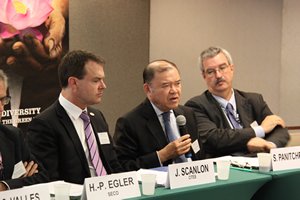18 June 2012
In the lead-up to the UNCSD - Rio+20 summit, the first Global BioTrade Congress was organised by UNCTAD in Rio de Janeiro on 18 June, with the support of the Swiss State Secretariat for Economic Affairs (SECO) and other partners.
BioTrade is one of the promising green economic sectors where developing countries have demonstrated a leadership role. BioTrade is the type of trade that supports biodiversity objectives while providing a source of income for local development.
Sixteen years after UNCTAD launched the BioTrade Initiative with the aim of promoting trade and investment in biodiversity as a means of furthering sustainable development, a number of countries, regions and national and international stakeholders have made remarkable progress in embracing BioTrade concepts and principles as integral parts of their strategies. Furthermore, BioTrade is being recognized as a tool to address poverty alleviation and to support sustainable livelihoods in developing countries.
Recognising that BioTrade is one of the pillars for achieving biodiversity conservation, sustainable use as well as post-conflict reintegration efforts, the First Global BioTrade Congress was conceived as a platform where BioTrade and biodiversity stakeholders could share their experiences and lessons learned, and establish further cooperation in implementing sustainable practices on the path to "greening" biodiversity-based sectors.
 Mr. Hans-Peter Egler (SECO), Mr. J. Scanlon (CITES) and Mr. Supachai Panitchpakdi (UNCTAD) |
For BioTrade businesses to move from a sum of niche markets to a worldwide consolidated green sector, adequate policies, rules, and market incentives need to be in place. Mr. J. Scanlon, Secretary General of CITES, indicated that “CITES is an example of how effectively regulated trade cannot only ensure maintenance of current levels of species populations but also to promote their growth, as the skin reptile trade has evidenced with sales estimated at 3 billion USD annually."
BioTrade is one of the pillars for the implementation and fulfilment of CBD (Convention on Biological Diversity) objectives and its Aichi targets. Current BioTrade programmes, experiences and lessons need to be gathered and strategically used in order to scale up sustainable practices. “It is time to go from policy discussion to implementation of CBD commitments and targets as shown by the BioTrade UNCTAD, one of the earlier implementing partners of the CBD," said Mr. Braulio Diaz of the CBD Secretariat.
But can BioTrade bring more that sustainable use and economic growth? A recently launched UNCTAD-UNDP partnership is exploring how to use BioTrade as a tool for sustaining security and local livelihoods in post-conflict reconstruction efforts in countries such as Colombia and Indonesia. Mrs. Sigrid Kaag of the UNDP expressed the view that "value chains enhancement can support the integration of those excluded by conflict while providing them with an economic and sustainable way out."
Speakers expressed appreciation for the long-standing support of Switzerland for the consolidation and expansion of BioTrade programmes worldwide. Mr. Hans-Peter Egler of SECO restated the Swiss commitments toward promoting open markets and enabling environments that facilitate a higher presence of BioTrade products from developing countries in international markets.
In addition to the support of the Swiss State Secretariat for Economic Affairs, the Congress received support from Yves Rocher and the Natural Resources Stewardship Circle (NRSC). Additional partners included the Andean Community General Secretariat, International Trade Centre (ITC), Colombian Ministry of Environment and Sustainable Development, Peruvian Ministry of Environment, PhytoTrade Africa, Union for Ethical BioTrade, and the Bureau of Crisis Prevention and Recovery of the UNDP.
The outcomes of the event are expected to be shared with participants to the Rio +20 summit.


